Reviewing the Eagle PS5 Designed Heatsink for SSD Upgrades
Technology moves fast! What was once considered fantastically unique and ‘one-off’ can all too soon become remarkably mainstream. Which is how we find the Eagle PS5 SSD Heatsink and its appearance on the console market. When Sony enabled SSD upgrades on the Playstation 5, the need for a heatsink to use alongside your SSD of choice was recommended by them (and all storage professionals) almost immediately. The newest commercially available generation of SSD storage (M.2 NVMe PCIe 4 x4 SSD), although fantastically fast, can get rather HOT when its optimal 7,000MB/s performance gets reached (and surpassed), so many users went ahead and ordered m.2 heatsinks for as little as $10 to allow the SSD to transfer that performance/durability negating heat out of the drive, into the heatsink and then allow it to be dispersed into the air. HOWEVER, it soon became apparent to many that these $10 M.2 SSD heatsinks that were designed for big, open PC cases were much, MUCH less effective in the more restrictive m.2 SSD slot of the PS5 (which even came with an m.2 cover plate to stop the heat of the heatsink entering the PS5 central cooling system BUT which in turn means that the SSD+Heatsink is encased in a small slot and all that heat has nowhere to go). So, shortly after the PS5 enabled the SSD expansion slot, some brands set to work designing heatsinks that were made AROUND the internal PS5 design, finding a balance between dissipating the heat of the SSD and ensuring the system remains cool. The first was the Sabrent PS5 Heatsink, launched at $25 on Sept 2021 (now available in bundles and at a more reasonable $20). Closely followed by more PS5 designed heatsinks that all evolved in different directions. The INEO, Graugear & Elecgear PS5 Heatsink (all launched in Nov 2021 at $30-35) was a much more aggressive and copper pipe fused heatsink for professional gamers and streamers. The PNY, a much thicker but prosumer designed model that used closed funnelling (arriving on Dec 2021 and at $25) came next and as you can already see, the releases become more frequent and the prices diverge. So, fast forward to NOW and you have a rather ‘out of nowhere’ heat dissipation solution for the console, the Eagle PS5 Designed SSD heatsink. The Eagle Heatsink represents the first real ‘unbranded style’ heatsink that has arrived on the scene available on the likes of Aliexpress, uBuy, eBay etc that seems to be a cheaper alternative (depending on where you look) to all of those other PS5 heatsinks that have arrived since. But does this means that this rather unknown release is a bit cheap and nasty, or a diamond in the rough? Let’s find out in today’s review of the Eagle PS5 SSD heatsink.
Eagle PS5 SSD Heatsink Review – Quick Conclusion
I genuinely WANTED to like the Eagle PS5 SSD heatsink, I really, REALLY did. The problem here is that it is another very familiar case of ‘you get what you pay for’ when shopping online and this heatsink somewhat dies the death of a thousand cuts – i.e there are so, so many small/niggling factors that undermine the whole thing. If you are looking for the best BUDGET PS5 heatsink to buy in 2022/2023, then I can definitely recommend the Eagle Heatsink for your PS5. But only to those that understand that a low price (as little as $7.99 in some places, e.g Aliexpress) comes with a notable degree of compromise. Does it work? Yes. Does it do a better job than a $10 PC designed m.2 SSD heatsink? Yes. Is it worth under $10? Yes. HOWEVER, the presentation of the heatsink and logic of the accessories at the retail level is horrendous, the pricing available online is completely bonkers, the physical/industrial cutting of the aluminium is pretty sub-par, the weight/quality of the heatsink seems underwhelming for its ultimate use, it clips the edge of the PS5 internal casing in a way that seems ill-thought and the whole product leaves you with a feeling that this heatsink is a bit of a quick cash-grab for budget eTailers! Of all the heatsinks that I have tested, I would put this very much at the bottom of all of them in terms of quality, but I still cannot fault that it does exactly what it says it can do and if you need a low-cost PS5 designed heatsink for your PS5 storage expansion upgrades, you will NOT get a better budget option right now.
Eagle PS5 SSD Heatsink Review – Retail Packaging
Ok, so I hate to start any review negatively, but my impressions of the Eagle PS5 SSD heatsink from purchasing it online to when the item first arrived with me were not great. First off, when the heatsink first arrived online, I owed it to my subscribers to get this featured and tested ASAP, so I went ahead and paid £32 for the heatsink on uBuy and an additional £17 shipping (so, that’s £59, or $81 US). Now, I was cool with that. However, within 48 hours of purchasing, I started seeing the same heatsink appearing online under differing names at 7-8 different budget component outlets. Prices ranged from as little as £7.99, to £23 and even as high as £41 and all of them seemed to ship from the same warehouse district of China, with specifications that differed wildly (some weigh specs and size around 20-25% different). So, even before the unit arrived a week later, I was already thinking “Yep – SCAM!”.
However, I was pleased to receive the unit from uBuy within the week promised. Now, I know uBuy is a massively budget eShop based business, but even then a think there is a fine line of difference between ‘cheap’ and ‘value’ that needed to be considered. Do remember that I have spent £32 on the SSD heatsink ($44) and that is more than the Sabrent, PNY and Elecgear . So, when the heatsink arrived in a basic padded envelope, no retail packaging and poorly printed/cut photocopies of instructions, I was less than impressed.

The full contents of the Eagle PS5 heatsink package were pretty underwhelming. Obviously, the key consideration for ANY heatsink is going to be how well it does the job, but I think most buyers who spend this kind of money as an alternative to a $10 M.2 heatsinks are going to have expectations that are going to be somewhat tarnished by this package.
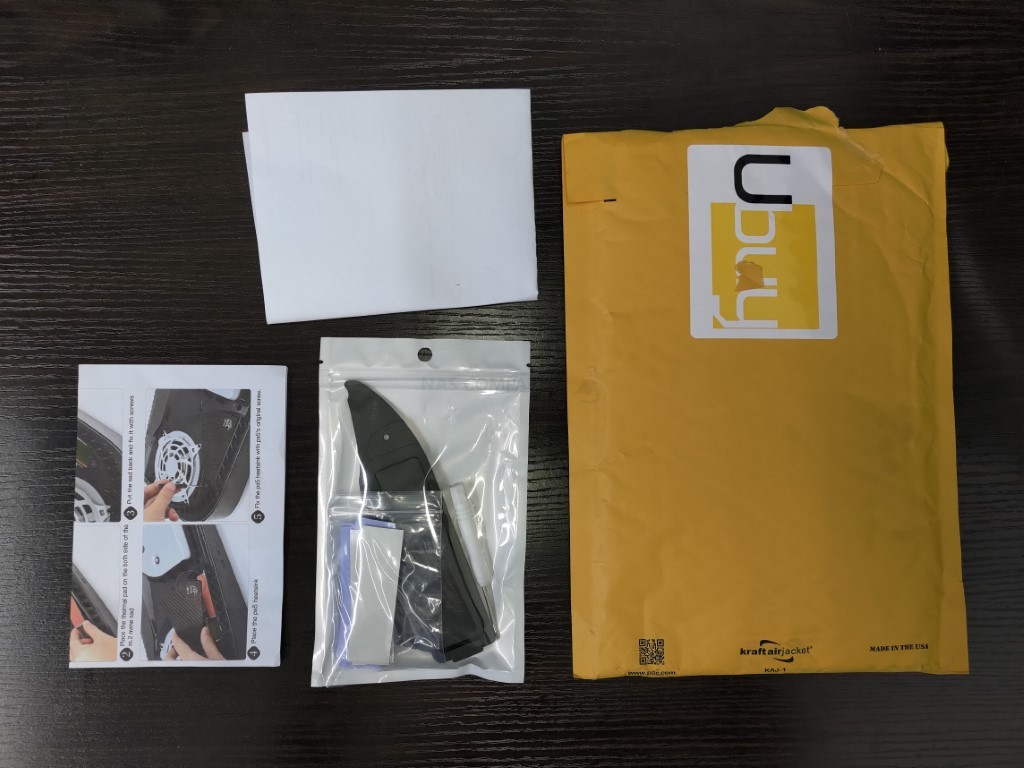
A close up of the key two main parts of the retail package shows you that what you have is kinda the bare minimum for the most part. It is also worth noting that the Eagle PS5 heatsink does not include any additional screws. The PS5 already has this in your console, but ALL the other PS5 designed heatsinks on the market include these and in the case of the Eagle PS5 heatsink they would be especially helpful later on (I will get to that).
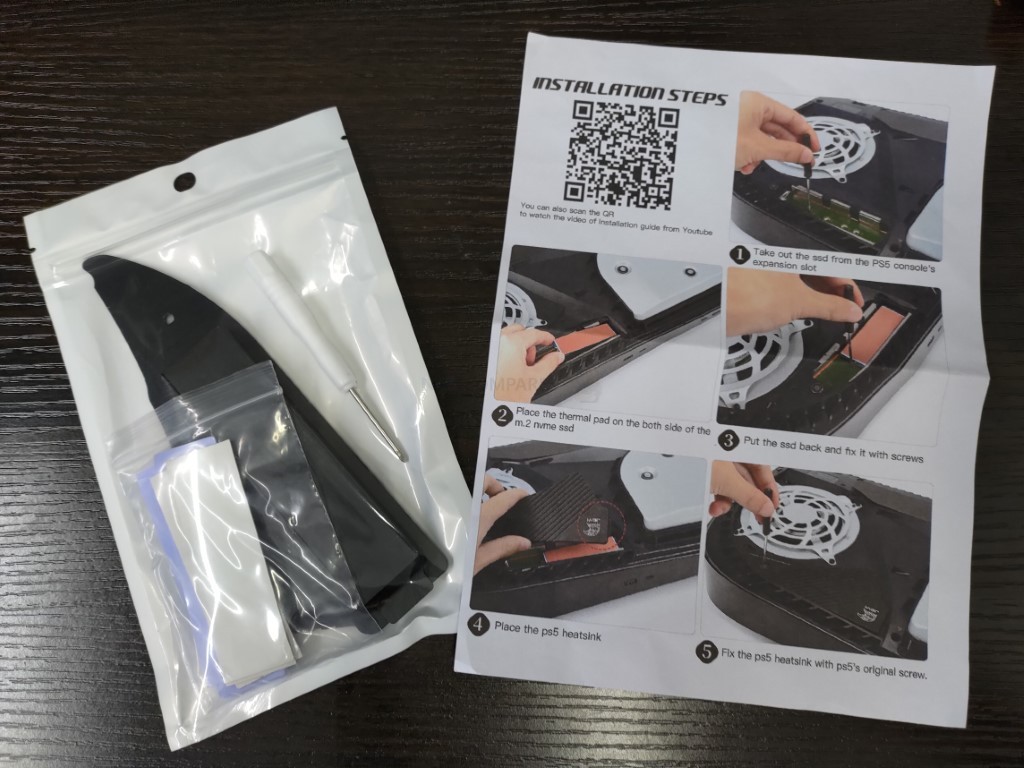
The included instructions are fantastically basic, leaving out important steps that the true novice will not be aware of (such as how to remove the PS5 side plates safely without damage or the m.2 Plate) which I admit are not exactly brain-surgery, but still important. There are numerous grammatical and capitalization errors which, although unimportant in the grand scheme of things) still undermine the whole product presentation.
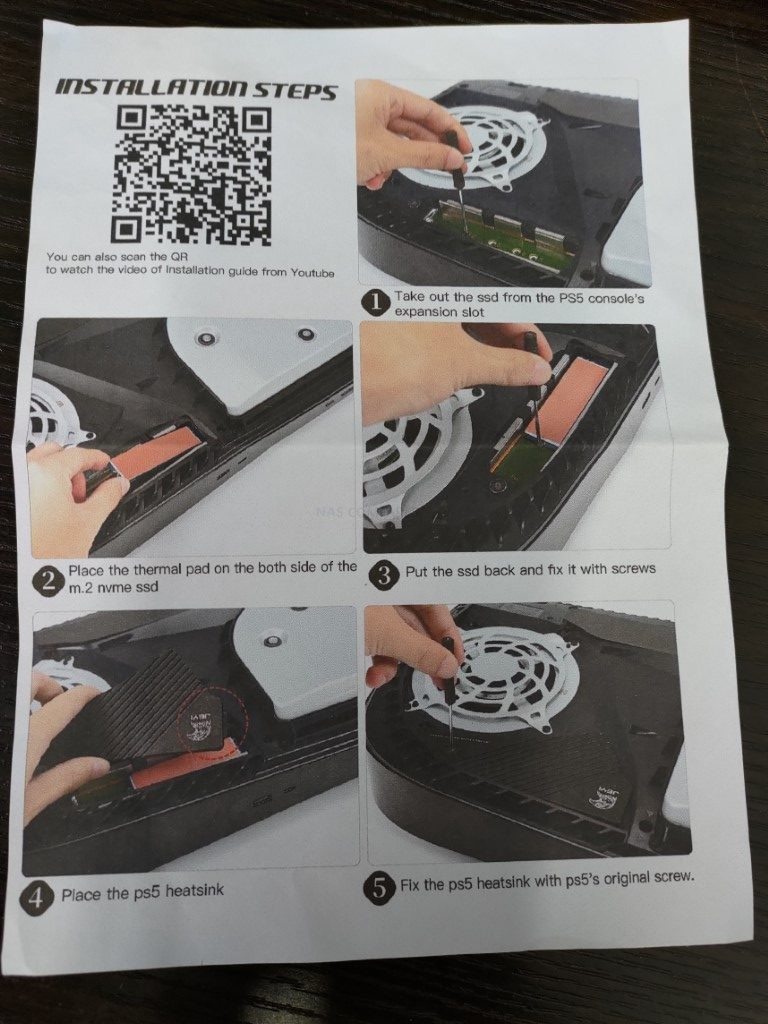
Then you have the main heatsink and accessories kit. In a plastic package, it contains an odd mix of the bare minimum required, yet unnecessary extras. Before we get onto the Eagle PS5 heatsink itself, let’s talk about those ‘extras’.
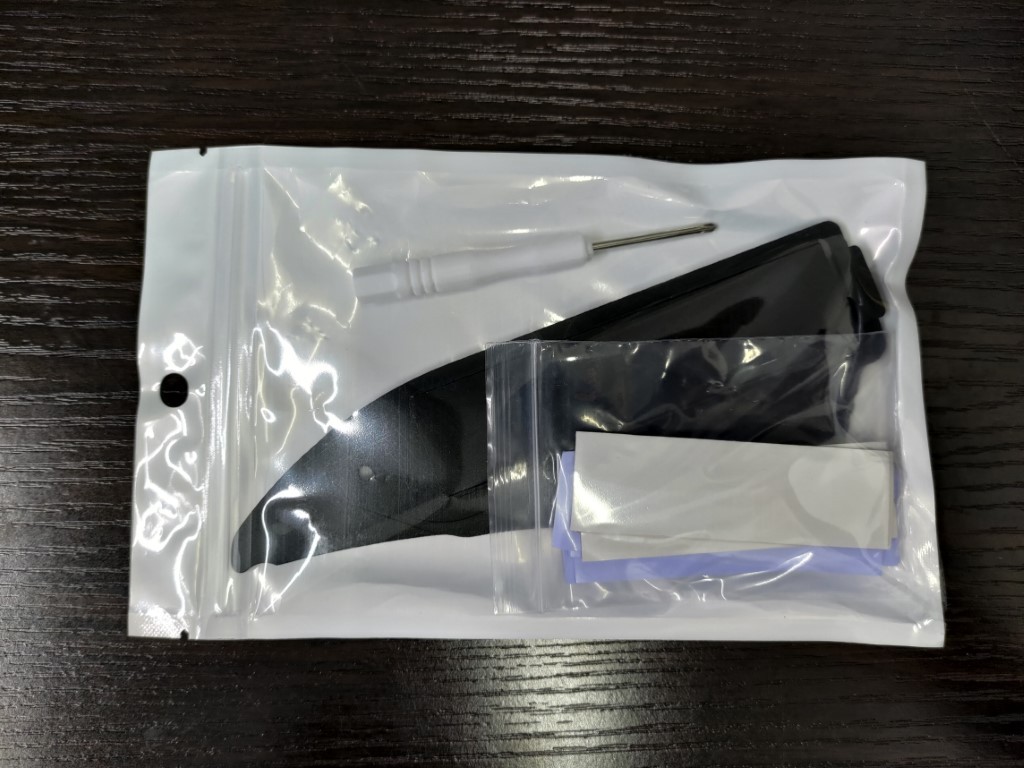
So, first, there are the thermal pads, with the Eagle PS5 heatsink arriving with 4 thick heat pads and 3 thinner pads. Why would you need x4 and x3? It’s nice to have spares, but you cannot help but feel like these have been thrown in arbitrarily and the excess is almost certainly down to them being stuck together. The inclusion of different thicknesses of the thermal pad is genuinely appreciated, but you are still left feeling that this is a bit ‘just lob them in there!’. Also, there is an inclusive heatsink that is fantastically poor quality and I would NOT recommend using this for your PS5 M.2/Main screw heads! The cross/Phillips head is too small for the main PS5 head screw and will likely tear it up and is too soft for the m.2 screw head and will likely just tear itself up and leave filament in the m.2 screws. So yeah, do not use it.
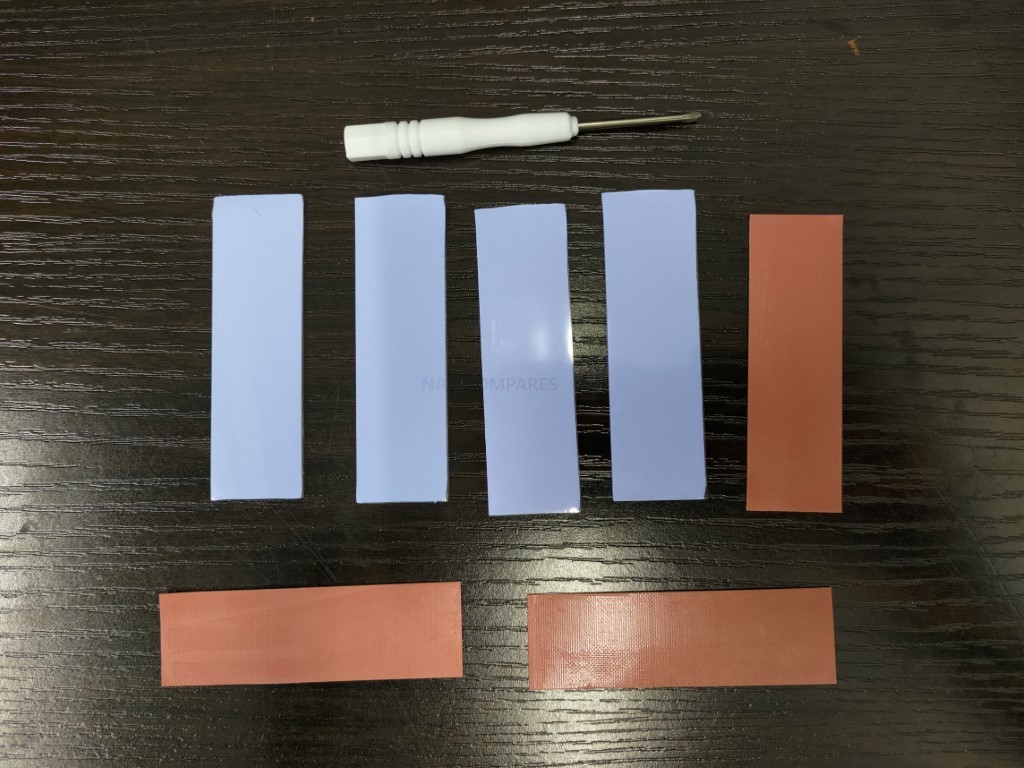
That said, I am still going to give them kudos/good marks for including the varied thickness of thermal pads. Very few heatsinks include two different thermal pads of thickness.

But that is enough for the packaging. Let’s discuss the build quality of the JEYI Eagle PS5 SSD Heatsink and see if it is worth the price.
Eagle PS5 SSD Heatsink Review – Design
The design and shape of the JEYI Eagle PS5 Designed heatsink are actually quite unique, looking a little like the claw/talon/beak of the bird the heatsink is named after. It is designed to live outside of the PS5 M.2 SSD bay partially and completely replace the existing PS5 M.2 expansion silver plate – though it still requires the use of the default PS5 m.2 screw and PS symbol embossed m.2 slot cover screw. The design is a little comparable to a couple of other SSD heatsinks for PS5 in the market from Sabrent and Elecgear , but is different enough that any legal questions of copying design are largely avoidable.
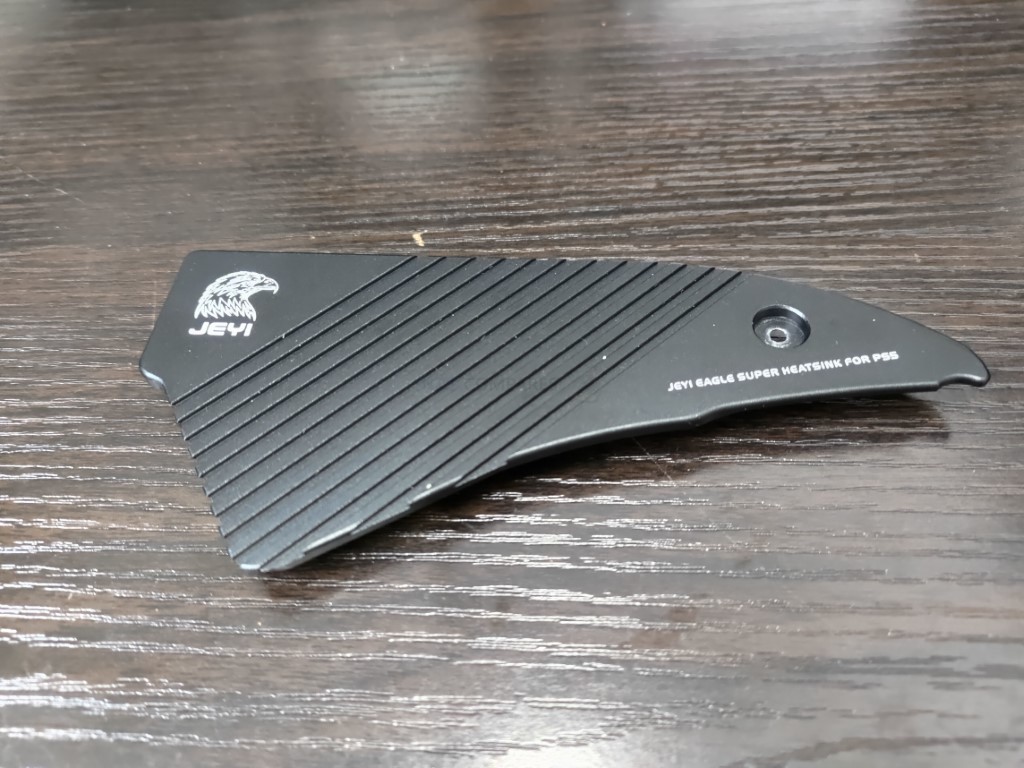
The most popular PS5 designed heatsink right now is the Sabrent SSD Heatsink, released in autumn 2021. Unlike the larger/wider spread of the JEYI Eagle heatsink, the Sabrent is content to jsut occupy the full M.2 SSD expansion slot of the PS5, featuring the same angular top design to capture the air as it passes through the PS5 front vents. Although it seems smaller in size, it does mean that the Sabrent will have much less of a potential impact on the PS5 ambient temperature. The Eagle is a pinch taller and makes a firmer connection with the SSD, but the Sabrent benefits from being available to buy as an SSD+Heatsink bundle (with larger capacity SSDs effectively including the heatsink at no additional cost). However, the Eagle PS5 heatsink is a lot more comparable to the Elecgear Heatsink in shape and method of dissipation.
|
JEYI Eagle PS5 SSD Heatsink
Larger and a fraction taller |
Sabrent PS5 Designed SSD Heatsink
|
Comparing the Eagle with the Elecgear PS5 SSD heatsink makes a little more sense, as both of these expand their design outside of the PS5 M.2 SSD slot and much greater into the ventilation path of the PS5’s internal fan. Though one of the biggest design differences is that the Elecgear is ventilated throughout to allow the collected heat to be directed into the raised fins. This means that the heat will be controlled into these standout points and cooled by the fans a great deal more efficiently. The Elecgear also has an internal, base located copper pipe design that funnels the heat into much more conductive material, adding the 2nd stage to the dissipation of the SSD controller, etc. The Eagle by comparison here really shows it’s rather more affordable design choices here and whereas it seemed to be a great heat dissipating design when compared with the Sabrent, here it looks a lot more pedestrian.
|
JEYI Eagle PS5 SSD Heatsink
Less ventilated but a similar shape |
Elecgear PS5 Designed SSD Heatsink
|
Much like other PS5 SSD heatsinks, the Eagle H/S has a slight base lip to allow the heatsink to hinge into the PS5 M.2 panel for easier installation.
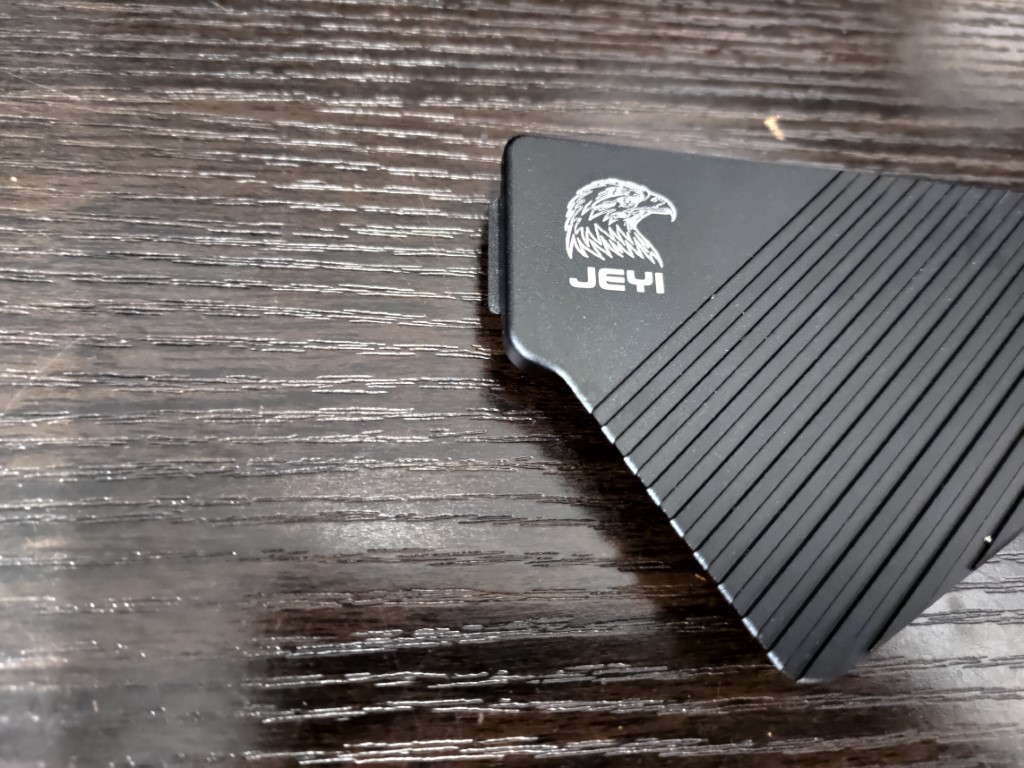
As mentioned earlier, the Eagle PS5 Heatsink does not include any additional screws and requires the use of the triangle, square, cross, circle screw that is normally used to keep the m.2 late cover in place, which is perfectly fine really. However, the screw-hole on the Eagle PS5 SSD H/S is quite poorly cut and a bit scratchy. Again, not really a big deal, but it is another small thing that gives you a vibe that these have been bashed out in a hurry.
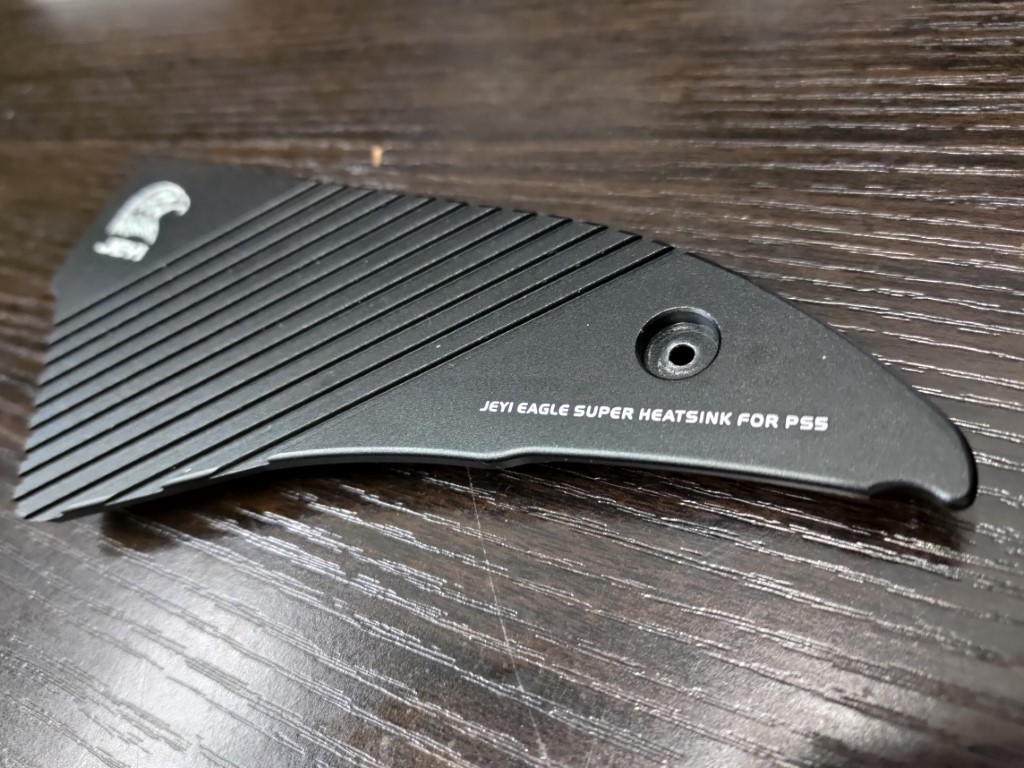
The top of the Eagle heatsink has grooves in it to funnel the air flowing through the PS5 internal fan assembly which is exactly what you would expect, as well as angled in alignment with the vents of the PS5 itself. They seem a little low but will certainly still be effective.
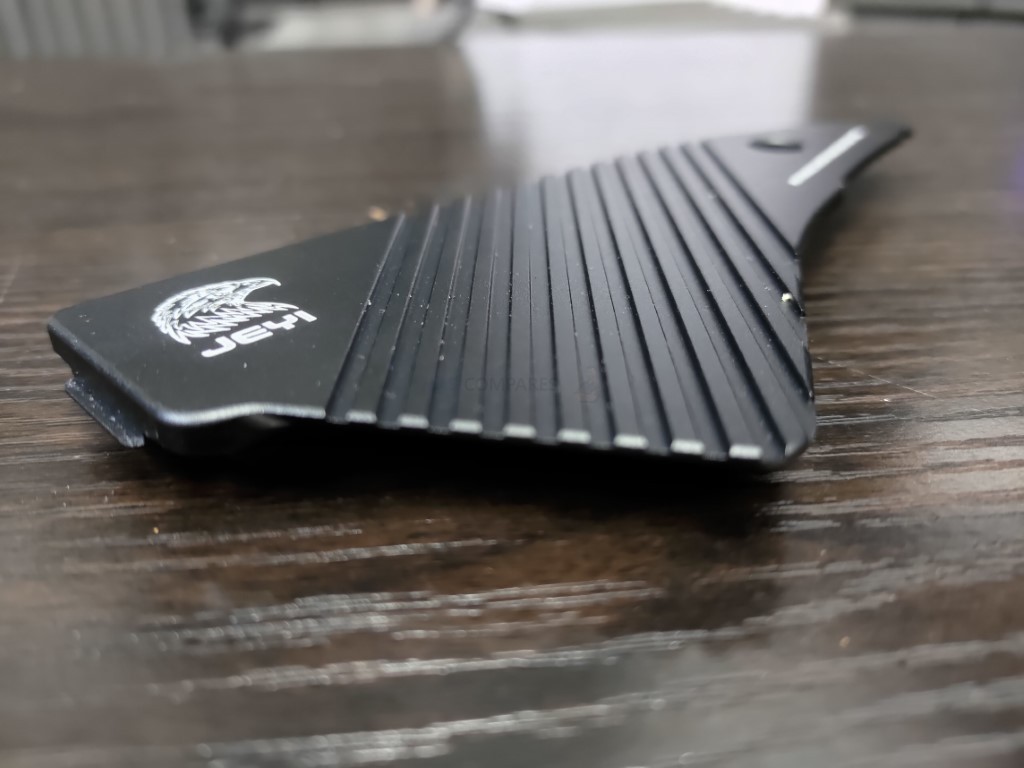
Flipping the heatsink over shows that the main SSD connecting portion of the build is a full 22110 length to occupy the full m.2 slot. I won’t complain about the lack of a thermal pad being pre-applied, as some users will want to use particular thicknesses, as well as the heatsink including a whole bunch of them. Also, it is certainly a deeper plate than the likes of the Sabrent, but it does still feel a little light compared with others.
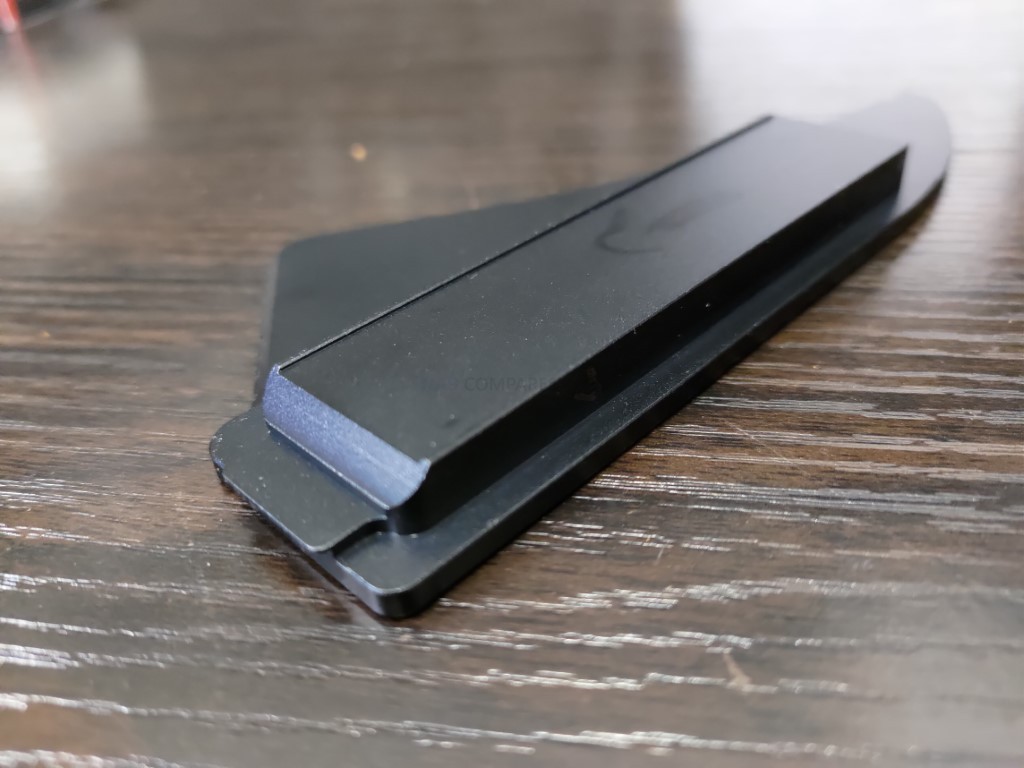
Let’s go through the act of installing the Eagle SSD Heatsink in the PS5.
Eagle PS5 SSD Heatsink Review – Installation
A Full walkthrough guide on the physical installation of an SSD in the PS5 SSD slot can be found here (don;t reinstall the m.2 cover plate if you intend on installing a custom/designed PS5 Heatsink – https://www.youtube.com/watch?v=qbpyX6GGGIQ
Once you have installed the SSD in the PS5 SSD expansion slot, as well as applied a thermal pad (ignore the wire shown in the picture, that is from my temperature testing of the EAGLE heatsink), you just need to place the Eagle Heatsink in alignment with the slit/hinge near the m.2 connector.
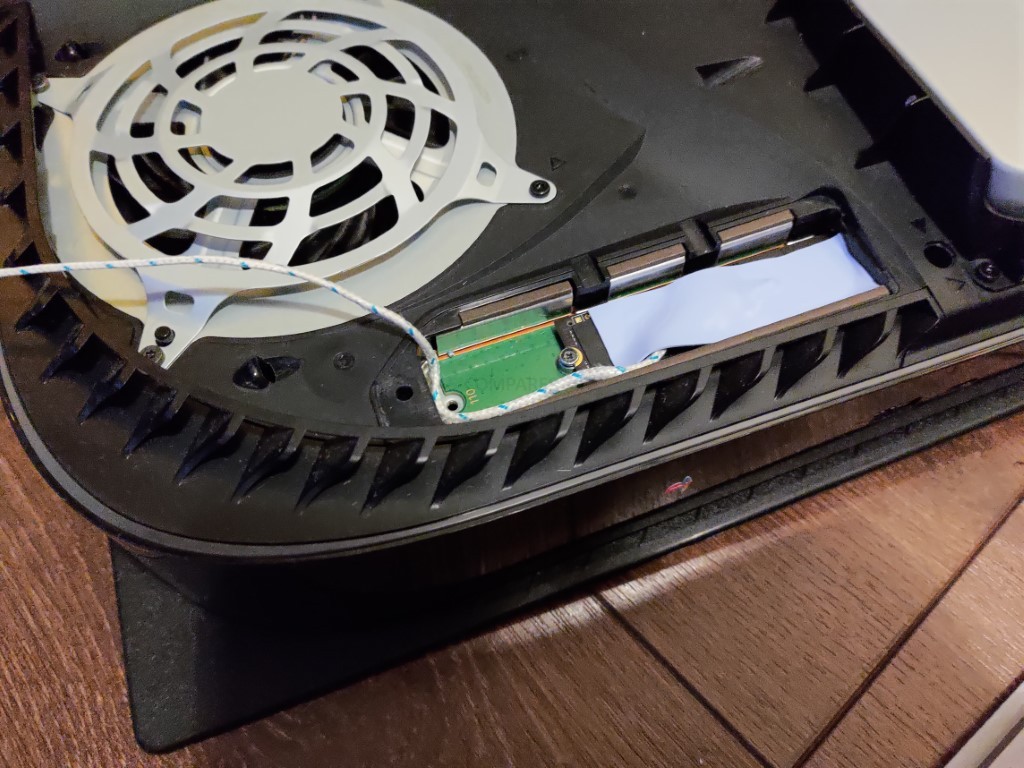
You will know that the Eagle PS5 heatsink is inserted correctly as it should lever down neatly with the screw hole in alignment with the m.2 SSD cover screw hole. One thing I did notice was that the heatsink does click the shape of the PS5 internal chassis frame a tiny bit when lowered. Not a massive issue, but never seen any other PS5 designed heatsinks have this small physical shape tap.
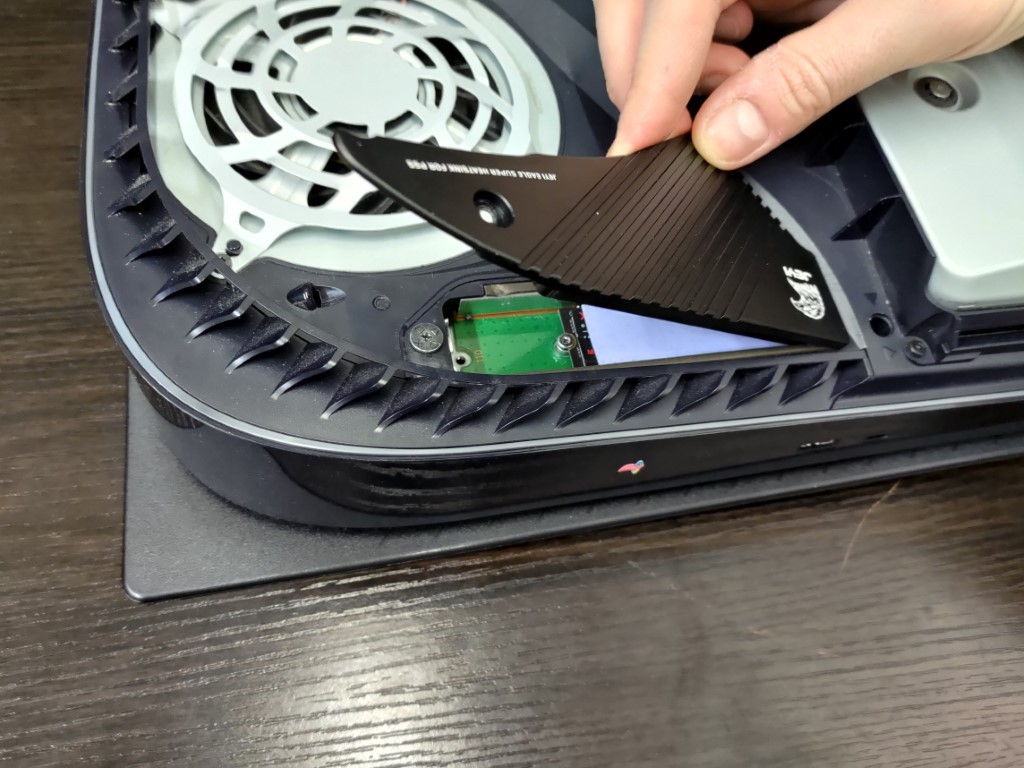
Before you screw the Eagle PS5 heatsink down on top of the SSD, make sure the base of the heatsink (when the eagle JEYI logo is) is in straight alignment with the slot. Else the heatsink will not be fully/evenly installed and then have limited connectivity with the SSD chips under the thermal pad.
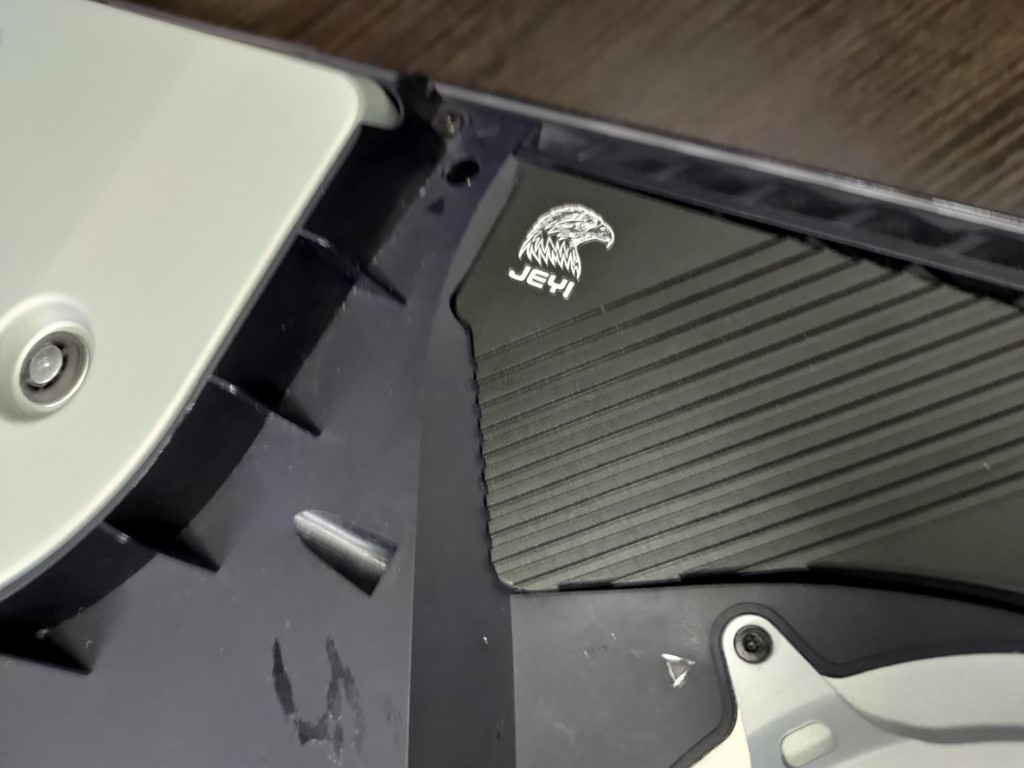
Then you can just go ahead and use the M.2 Expansion slot cover screw in the available hole of the Eagle PS5 SSD heatsink. No need to go in too heavy-handed, just screw till you feel moderate resistance. The heatsink is thicker than the typical M.2 Aluminimum cover plate, so it will not go into the screw-hole as far – overdoing it might tear the threads of the screw hole unnecessarily.
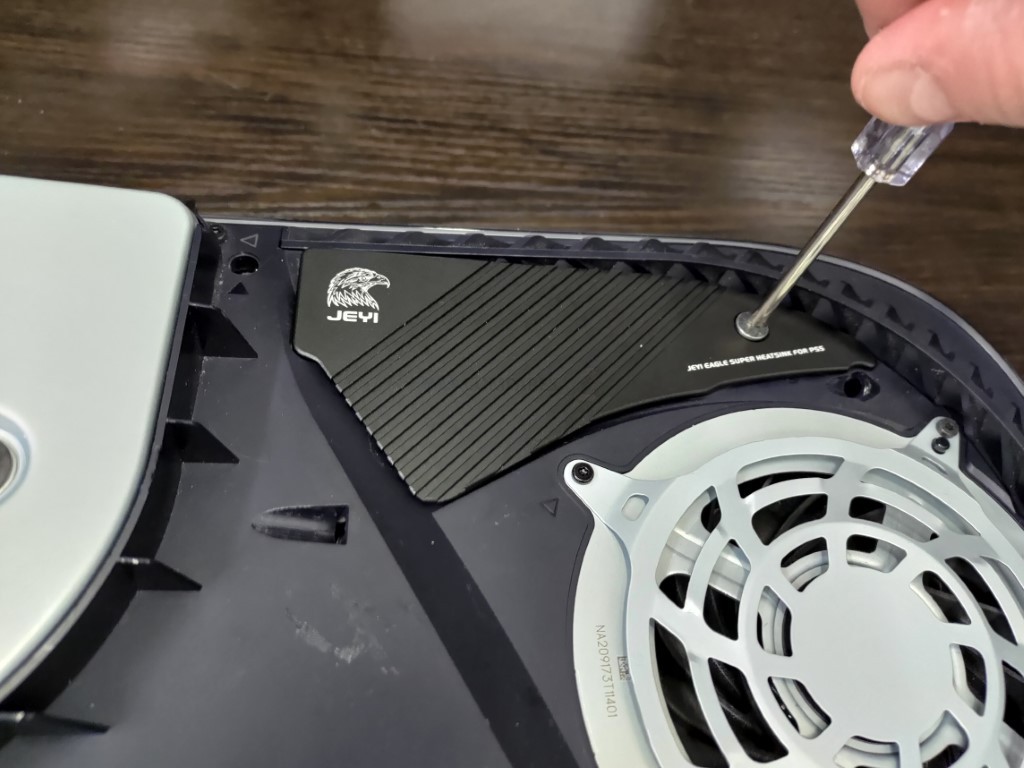
And that is about it. That single screw will hold the plate in place (thanks to that lever lip design on the other side) and as you can see from the finished image of the PS5 below, the grooves on top of the Eagle heatsink are completely parallel with the angled vent slots on the console.
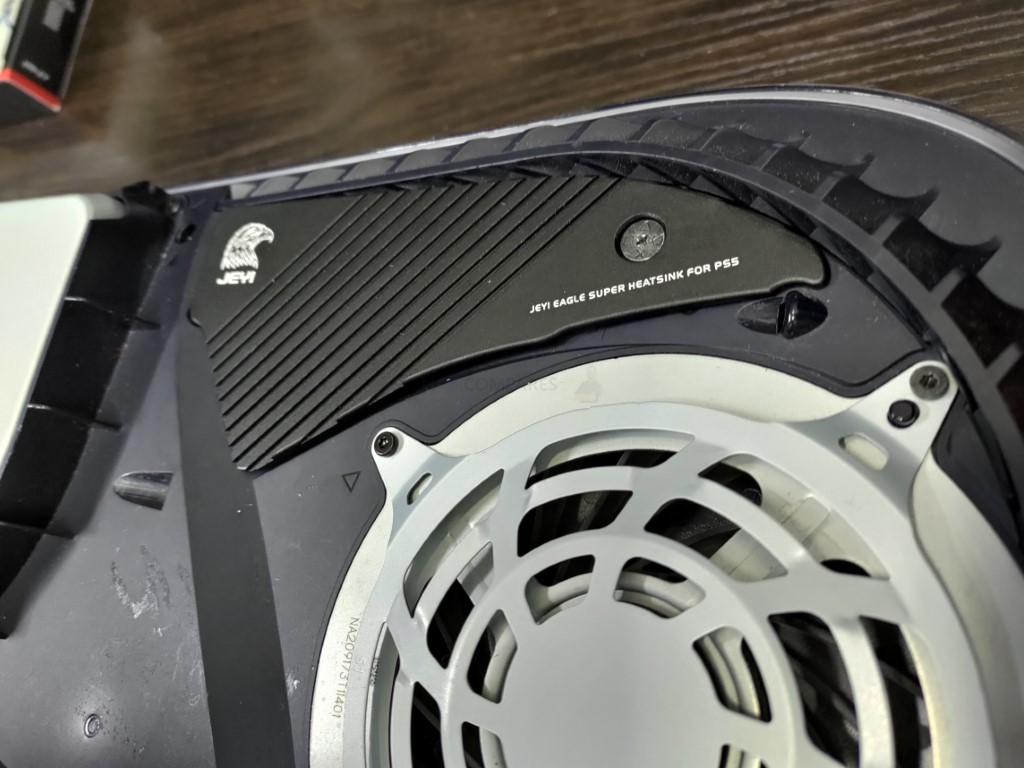
If you look at the front of the PS5, you are able to see how close and raised the grooves of the Eagle SSD heatsink are visible. The Eagle heatsink certainly doesn’t block the vent but is definitely one of the more chunky heatsink’s that I have installed till now. As soon as your PS5 side plates are reapplied, then the heatsink will be near enough invisible, but I am still the tiniest bit concerned with how much of the ventilation it appears to be in front of.
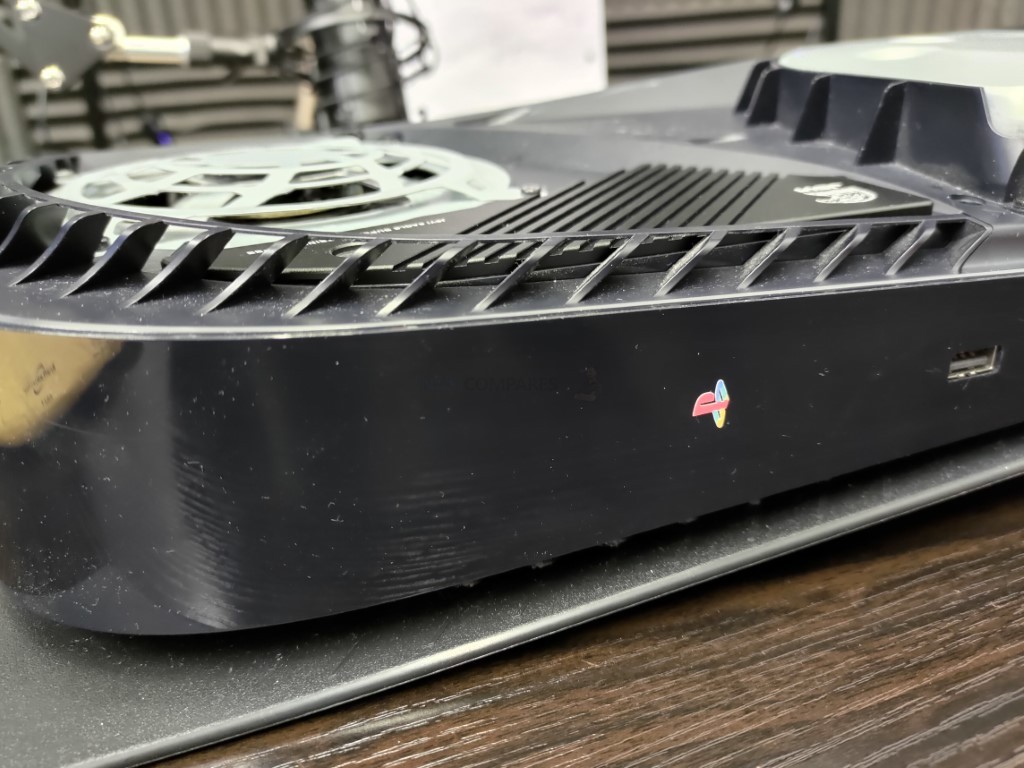
So, that is how the heatsink looks when installed and how easy it is. But how about how well it works? Let’s run some temperature testing to see how well it does it’s job in heavy read, heavy write and gameplay instances.
Eagle PS5 SSD Heatsink Review – Temperature Testings
Temperature testing for the Eagle PS5 SSD heatsink has been broken down into several areas. The main aims here are to work out the following things:
- Does the Eagle Heatsink Keep the Temperature low on the SSD in sustained use?
- Does the Eagle Heatsink Interfere with the PS5 Internal System Temp negatively?
- Is the Eagle Heatsink provide a significant improvement over PC designed M.2 SSD heatsinks (eg the Eluteng M.2)
In order to do this, I have installed a temperature sensor on the M.2 SSD itself, UNDER the heatsink AND the thermal pad, directly on the controller chip of the SSD. The SSD used in the testing was the PNY XLR8 CS3140, a Phison E18, 96L 3D TLC NAND SSD at 1TB – a good mid-range price point SSD that is single-sided and provides 6551MB/s on the PS5 internal benchmark.
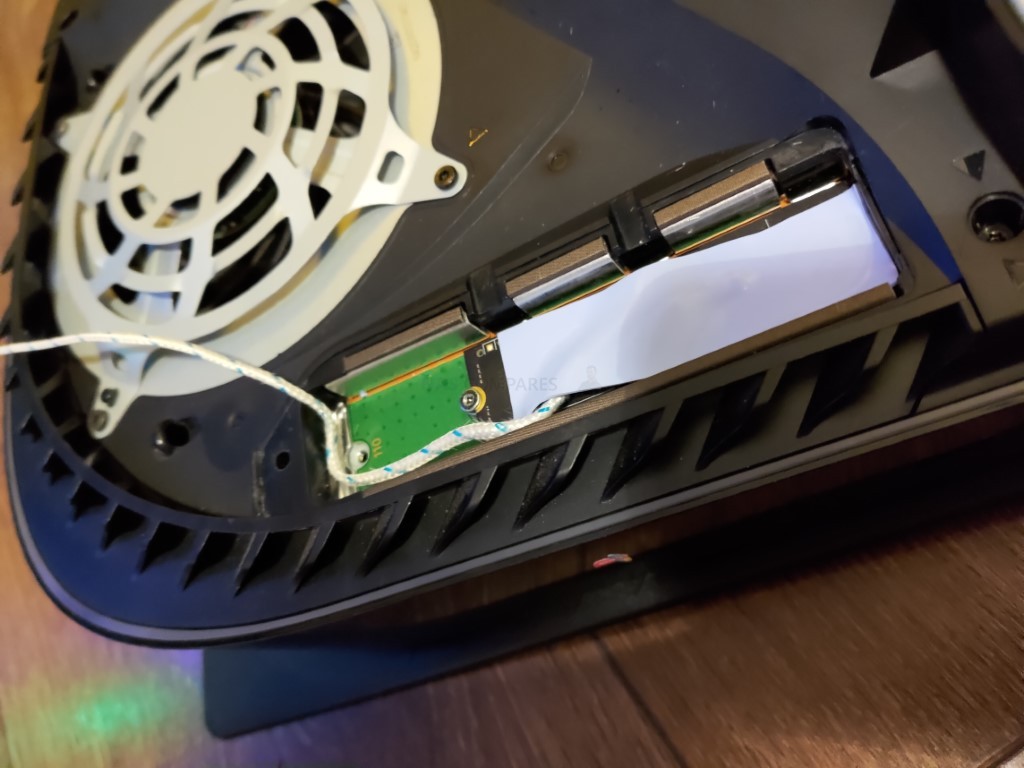
When the temp node is on the SSD Controller, I then place the thermal pad down, closed and screw down the heatsink, then attach the 2nd node just underneath the PS5 fan point, in the open air. This second temperature sensor will tell us the surrounding system temp that the internal fan will be using to cool the rest of the system. The testing consisted of 6 different elements. 4 gameplay sessions of 25mins each, with 2 sessions focusing on the SSD temp and 2 focusing on the system temp (in that order, with 1-2 mins reboot between each, in order to see how the system temp is affected over the combined power-on time). Then a sustained read and write activity of 360MB/s to/from the PS5 internal PS5 SSD and M.2 NVMe SSD (the PNY XLR8 CS3140) and how it impacted the SSD controller only. We are NOT looking at performance/framerate/MB/s etc, ONLY temperatures. Below were the results (video will be published shortly).
Note – BOTH PS5 Side plates were on during the tests
 |
|||
| Test Type | Starting Temp (C) | Finishing Temp (C) | Change (C) |
| Heavy Write (350GB) | 27.9℃ | 43.5℃ | 15.6℃ |
| Demon Souls 25min Play (Controller) | 26.3℃ | 40.1℃ | 13.8℃ |
| Demon Souls 25min Play (System Temp) | 27.0℃ | 28.2℃ | 1.2℃ |
| Matrix Unreal 5 25min Play (Controller) | 36.9℃ | 42.2℃ | 5.3℃ |
| Matrix Unreal 5 25min Play (System Temp) | 27.6℃ | 27.7℃ | 0.1℃ |
| Heavy Read (350GB) | 34.0℃ | 38.1℃ | 4.1℃ |
So, taking a closer look at the results above, we can work out a few things. First off, there is no denying that the Eagle PS5 Designed SSD heatsink works. Had an SSD been installed inside a PS5 without a heatsink, these temperatures would have easily doubled and (in the case of the heavy write activity) likely exceeded the 70℃ maximum of an SSD before it throttles it’s own performance in efforts to maintain the lifespan of the drive. However, these are still not great temps for this SSD to have after 4x relatively short gameplay sessions (and the data migration instances). To put these stats into a little perspective, below is the exact same tests being conducted with a basic $10 m.2 heat sink that is designed for more general PC use:
NOTE – There tests were performed on different days and ambient temp AND general environmental conditions can undermine these results. Watch the video published soon to see these results in much, MUCH greater detail)
| Test Type | Eluteng H/S Change | Eagle H/S Change |
| Heavy Write (350GB) | 15.1℃ | 15.6℃ |
| Demon Souls 25min Play (Controller) | 23.3℃ | 13.8℃ |
| Demon Souls 25min Play (System Temp) | 0.5℃ | 1.2℃ |
| Matrix Unreal 5 25min Play (Controller) | 16.3℃ | 5.3℃ |
| Matrix Unreal 5 25min Play (System Temp) | 1.8℃ | 0.1℃ |
| Heavy Write (350GB) | 18.8℃ | 4.1℃ |
So, YES the Eagle heatsink certainly resulted in a lower overall increase, but the numbers in some cases were a lot closer than I would have expected (especially when you compare these results against that of the Sabrent PS5 Heatsink, the INEO, Graugear & Elecgear PS5 Heatsink (all of which were drastically better). These tests still firmly showed that this heatsink was able to dissipate more heat away from the SSD than a generic alternative, but also still show that the difference is negociable at this pricepoint when there are $20 alternatives doing it better.
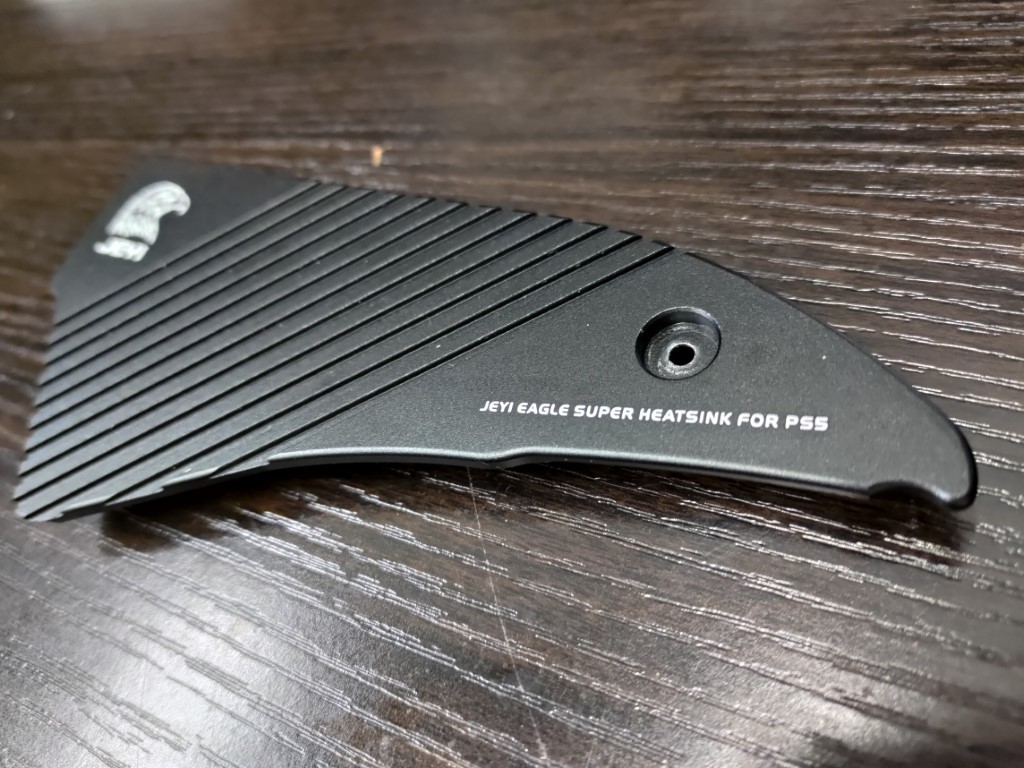
NOTE – The FULL video of the Temperature tests for the Eagle PS5 SSD Heatsink, as well as how it compares against the Eluteng M.2 Heatsink, the Sabrent PS5 heatsink and the INEO Heatsink Heatsink will be live soon and in a2-Part Series.
Eagle PS5 SSD Heatsink Review – Conclusion & Verdict
I genuinely WANTED to like the Eagle PS5 SSD heatsink, I really, REALLY did. The problem here is that it is another very familiar case of ‘you get what you pay for’ when shopping online and this heatsink somewhat dies the death of a thousand cuts – i.e there are so, so many small/niggling factors that undermine the whole thing. If you are looking for the best BUDGET PS5 heatsink to buy in 2022/2023, then I can definitely recommend the Eagle Heatsink for your PS5. But only to those that understand that a low price (as little as $7.99 in some places, e.g Aliexpress) comes with a notable degree of compromise. Does it work? Yes. Does it do a better job than a $10 PC designed m.2 SSD heatsink? Yes. Is it worth under $10? Yes. HOWEVER, the presentation of the heatsink and logic of the accessories at the retail level is horrendous, the pricing available online is completely bonkers, the physical/industrial cutting of the aluminium is pretty sub-par, the weight/quality of the heatsink seems underwhelming for its ultimate use, it clips the edge of the PS5 internal casing in a way that seems ill-thought and the whole product leaves you with a feeling that this heatsink is a bit of a quick cash-grab for budget eTailers! Of all the heatsinks that I have tested, I would put this very much at the bottom of all of them in terms of quality, but I still cannot fault that it does exactly what it says it can do and if you need a low-cost PS5 designed heatsink for your PS5 storage expansion upgrades, you will NOT get a better budget option right now.
| PROS of the Eagle PS5 SSD Heatsink | PROS of the Eagle PS5 SSD Heatsink |
|
|
🔒 Join Inner Circle
Get an alert every time something gets added to this specific article!
This description contains links to Amazon. These links will take you to some of the products mentioned in today's content. As an Amazon Associate, I earn from qualifying purchases. Visit the NASCompares Deal Finder to find the best place to buy this device in your region, based on Service, Support and Reputation - Just Search for your NAS Drive in the Box Below
Need Advice on Data Storage from an Expert?
Finally, for free advice about your setup, just leave a message in the comments below here at NASCompares.com and we will get back to you. Need Help?
Where possible (and where appropriate) please provide as much information about your requirements, as then I can arrange the best answer and solution to your needs. Do not worry about your e-mail address being required, it will NOT be used in a mailing list and will NOT be used in any way other than to respond to your enquiry.
Need Help?
Where possible (and where appropriate) please provide as much information about your requirements, as then I can arrange the best answer and solution to your needs. Do not worry about your e-mail address being required, it will NOT be used in a mailing list and will NOT be used in any way other than to respond to your enquiry.

|
 |
WHY IS PLEX A BIT S#!t NOW? IS 2026 JELLYFIN TIME? (RAID Room)
Synology FS200T NAS is STILL COMING... But... WHY?
Gl.iNet vs UniFi Travel Routers - Which Should You Buy?
UnifyDrive UP6 Mobile NAS Review
UniFi Travel Router Tests - Aeroplane Sharing, WiFi Portals, Power Draw, Heat and More
UGREEN iDX6011 Pro NAS Review
Access content via Patreon or KO-FI





Discover more from NAS Compares
Subscribe to get the latest posts sent to your email.


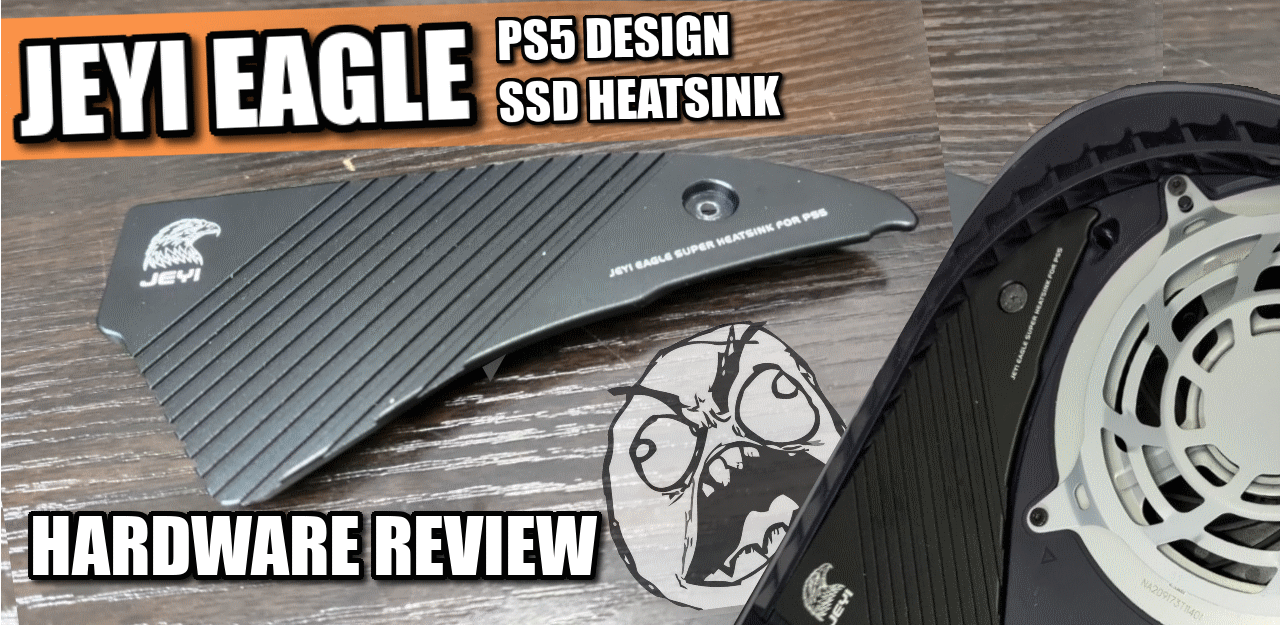
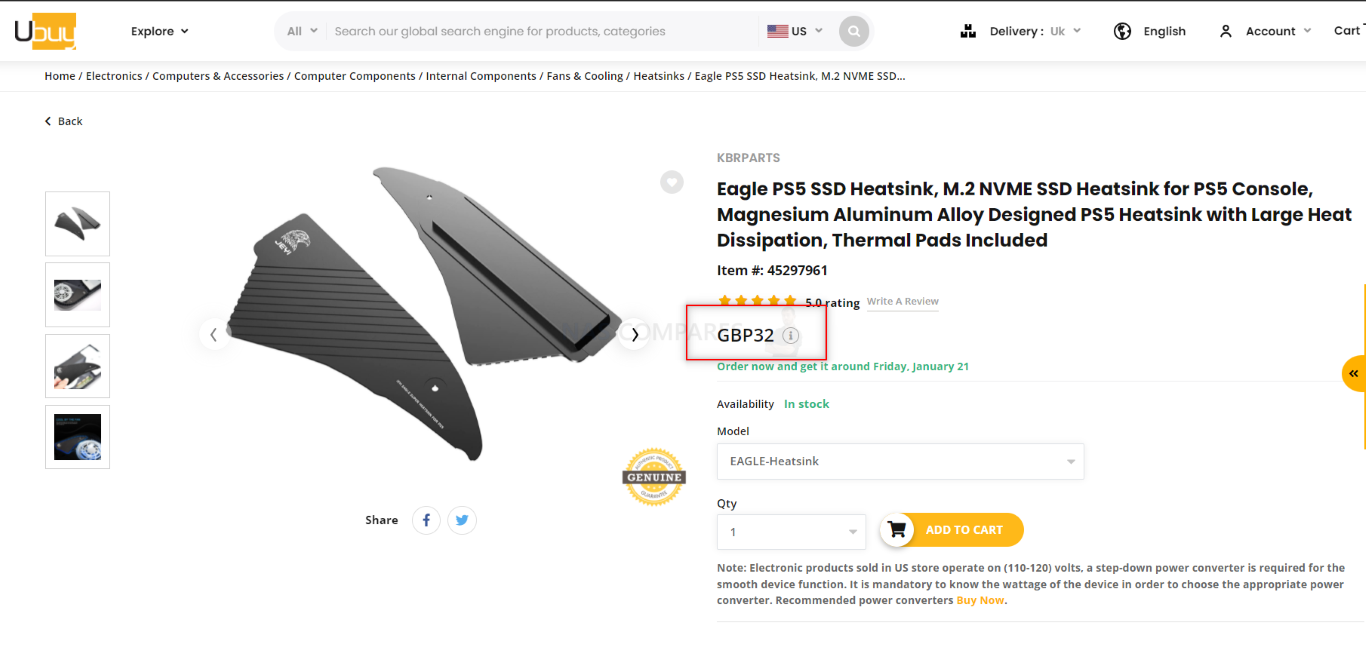
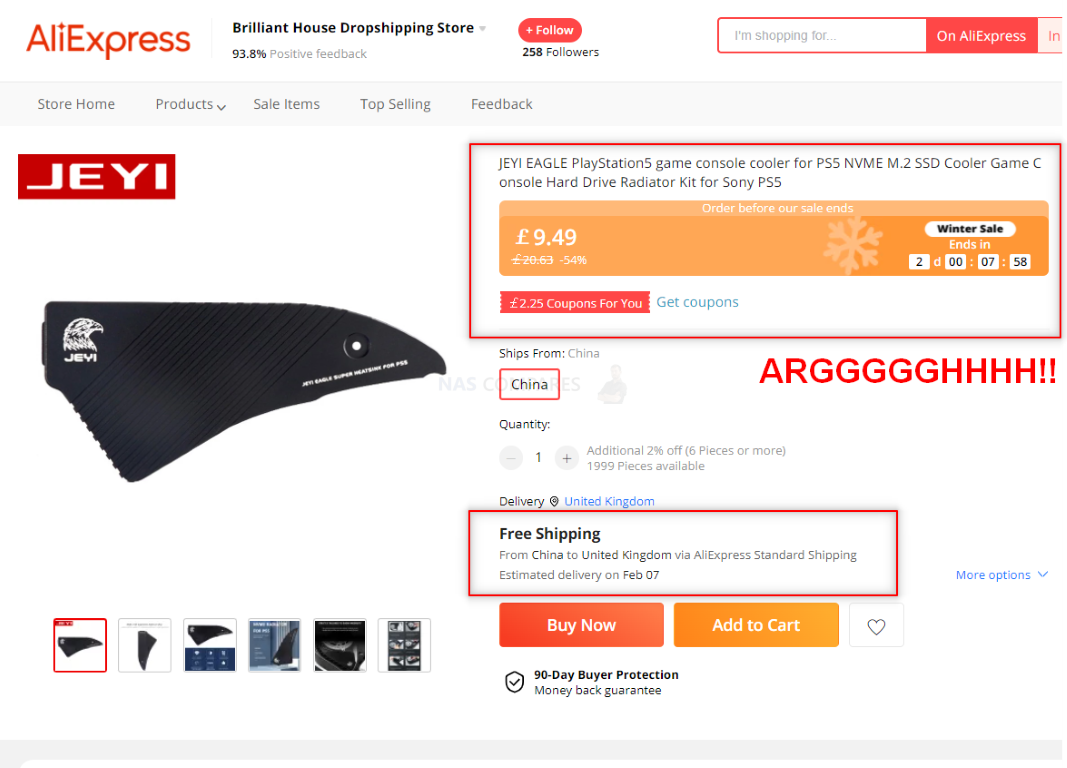
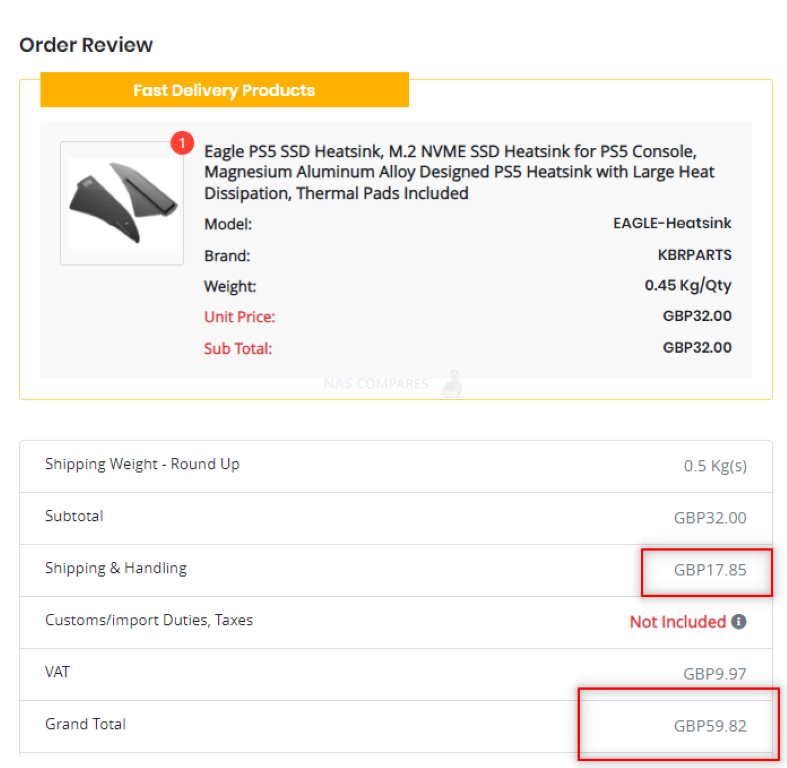
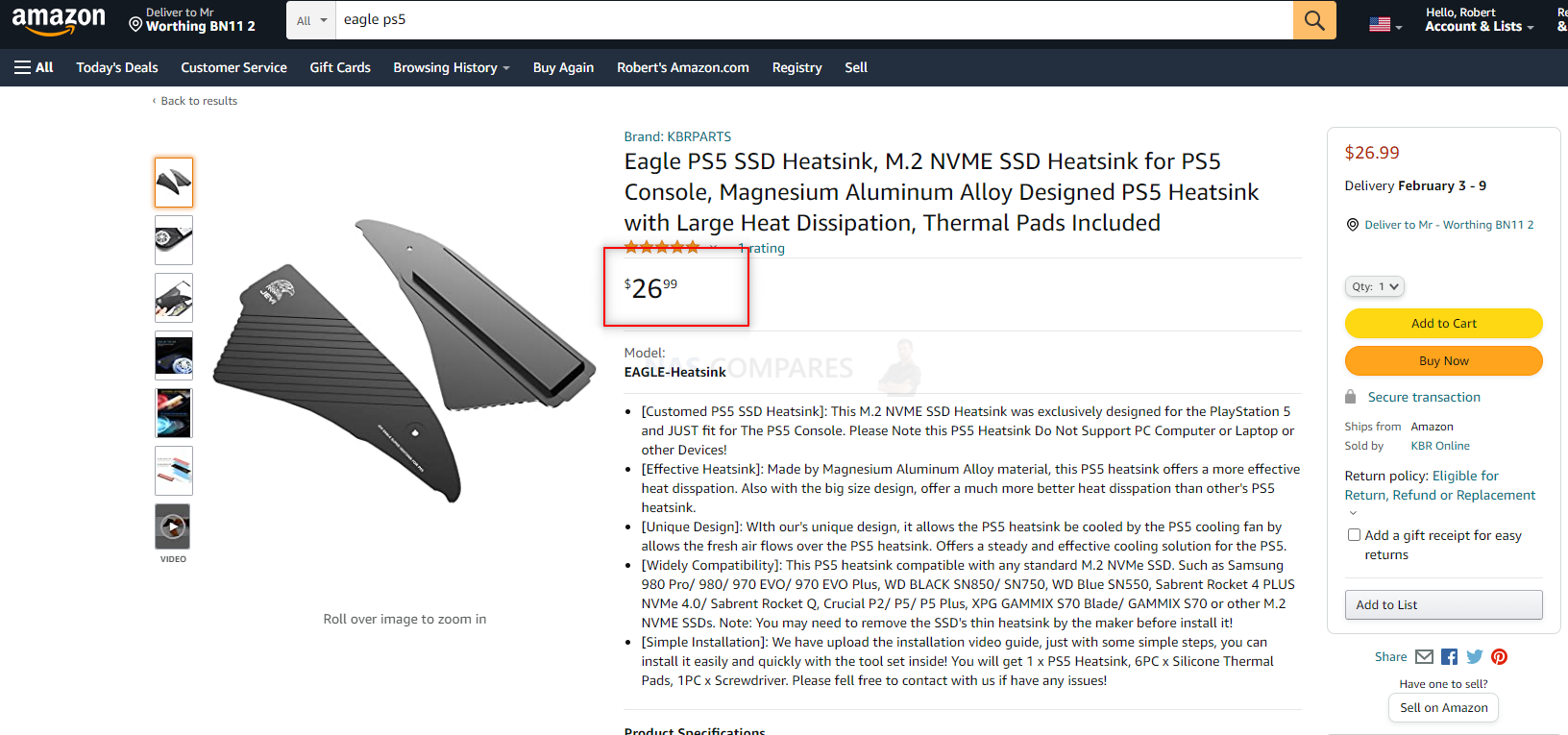
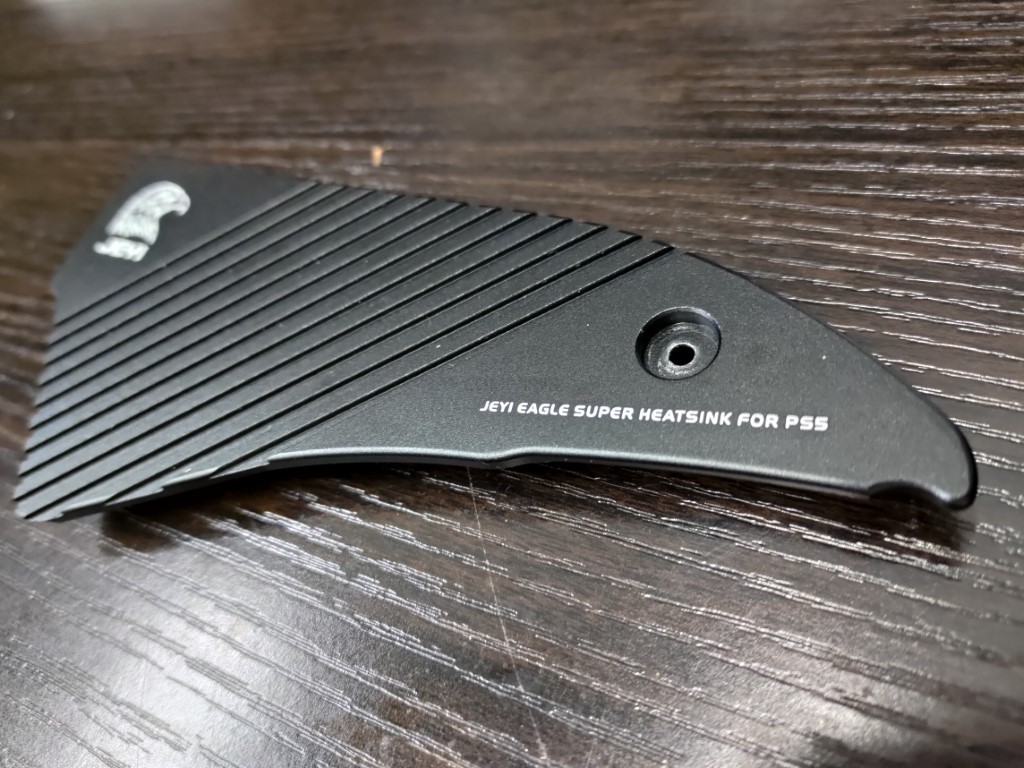
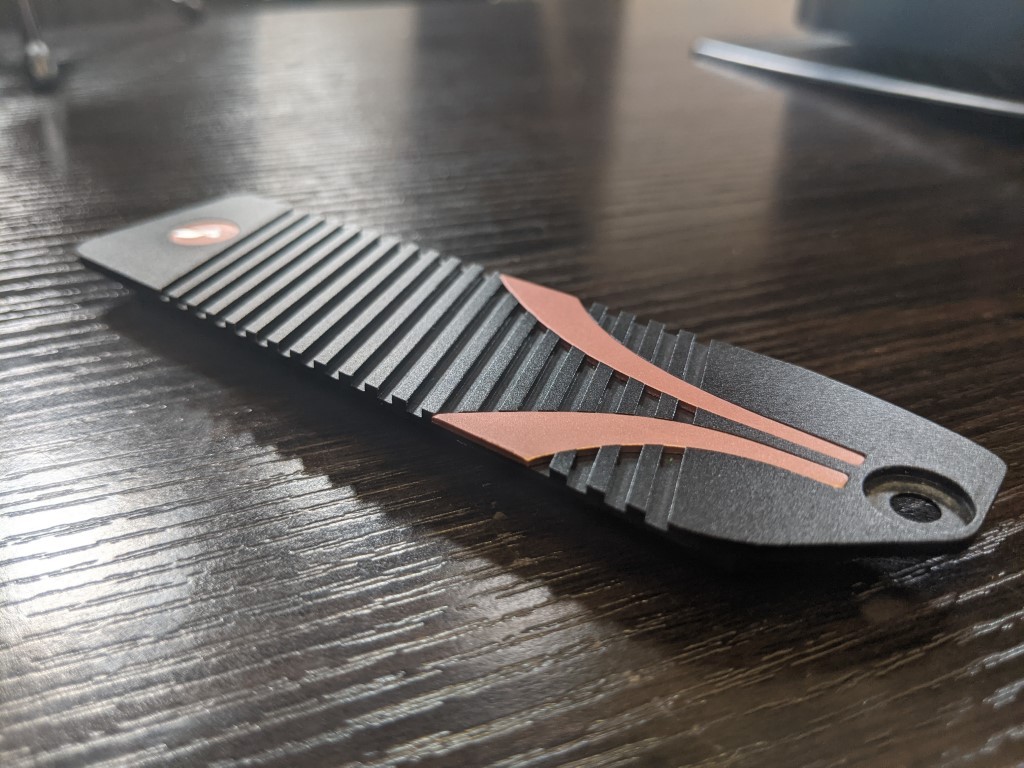
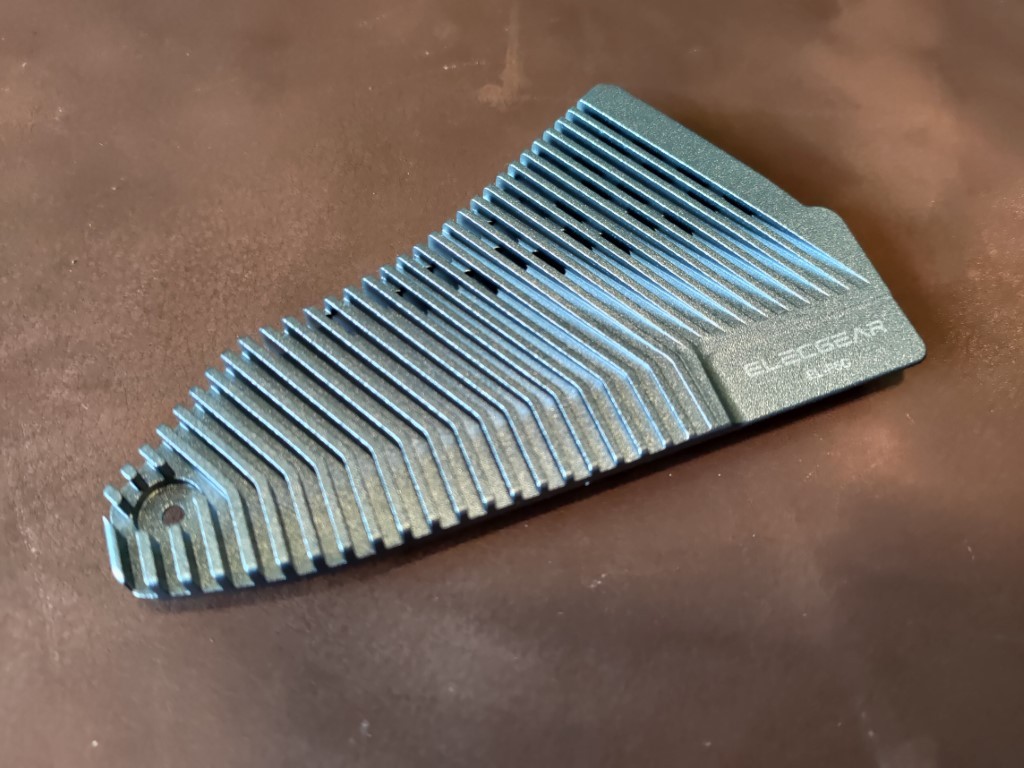




You don’t show installing the ssd you don’t show applying the strips this video is worthless!
REPLY ON YOUTUBE
Se non si chiudono le maschere come fa l’aria a essere convogliata sulle piastre di raffreddamento?
REPLY ON YOUTUBE
Eyyy this is 4 years old but I just installed my first ssd ❤thanks : )
REPLY ON YOUTUBE
So is elecgear still the best?
REPLY ON YOUTUBE
Замечательное видео!)
REPLY ON YOUTUBE
Wich thermo pad U used to set all together on that jeyi ?
REPLY ON YOUTUBE
Смотреть с 15:35
REPLY ON YOUTUBE
Great review. Please review the Ineo Radiator with copper bar, looks might similar to the Overpriced Elecgear
REPLY ON YOUTUBE
Can we use as a normal plate for the dezine?
REPLY ON YOUTUBE
Fantastically negative review. I love it.
REPLY ON YOUTUBE
Thank you for this fully explained video about those awesome heathsinks!
Also, thank for the declare!
REPLY ON YOUTUBE
A bit late to the party, I am based in Shenzhen and I got this exact same one for 76RMB, which is about a tenner (ish). Mine came in a box with packaging etc. Your seller was clearly trying to avoid Royal Mail’s boxed packaging weight/size shipping charges and just sent you the stuff from the box.
REPLY ON YOUTUBE
Hello, dear, your ps5 looks very cool) Tell me or give a link where you bought it?
PS Thanks in advance)
REPLY ON YOUTUBE
I saw your guide and bought a 2TB NVME and used this vid and everything went perfect first try. Powered on, formatted, and off to the races! Thanks man. Removing the plastic plate was the hardest part for some reason.
REPLY ON YOUTUBE
Is it possible to use this eagle heatsink cover together with kingston fury renegade for my ps5? Does sticking the provided thermal paste onto the thin graphene spreader that originally came with the kingston ssd work? Or should I just replace the ps5 original ssd cover with eagle heat sink ssd cover without using any thermal paste on my kingston ssd? Anyone can answer this? Thank you
REPLY ON YOUTUBE
It isn’t as dense as other units. It feels super light. less dense=less material=less heatsink which means it cant handle the heat transference.
REPLY ON YOUTUBE
how many should put thermal pad on SSD (samsung 980 pro) each side ?
REPLY ON YOUTUBE
Hi. I do not know English. Can you please tell me what is the optimal heatsink for ps5? wd sn850. to cool the ssd itself and not to heat the system.
REPLY ON YOUTUBE
You bought it from a dropshipping mofo …
REPLY ON YOUTUBE
I have a Samsung 980 pro SSD with heatsink. Is there an upgraded M2 cover that will work with this?
REPLY ON YOUTUBE
I dunno, the performance seems decent when considering the price – not the price that you paid. Most of the other custom ps5 heatsink are horribly overpriced for a passive heatsink.
REPLY ON YOUTUBE
you’re now be like my teacher to teach me about Gaming Performance Hardware sir !! ????????????????????
REPLY ON YOUTUBE
nice review. probably wouldn’t bend but snap instead since i think (hope) it’s an aluminum heat sink.
thank you for this in-depth review
REPLY ON YOUTUBE
I purchased the gammix blade and the elecgear heatsink. I wondering if I should use the s70 blade heatsink with the elecgear or use the included thermal pads?
REPLY ON YOUTUBE
Hi! What ssd was in this test?
REPLY ON YOUTUBE
Where did you get the ps2 nostalgic case !?
REPLY ON YOUTUBE
What about the ineo one that’s shaped like this it any good? ineo PS5 Heatsink, M.2 NVME SSD Heatsink for PS5 Internal PCIe M.2 NVMe 4.0 Gen4 Gaming SSD, Magnesium Aluminum Alloy Designed with Large Heat Dissipation, Graphene Thermal Pads Included [M25]
REPLY ON YOUTUBE
JEYI PS5 MOMTAJE ????2022
REPLY ON YOUTUBE
The cost efficiency make me buy eagle sink, better than m2 sink is good for me.
REPLY ON YOUTUBE
Although I don’t agree with NAS about this Heatsink not being very high quality, the data doesn’t lie. The eagle Heatsink is not worth the money when compared to the Sabrent Heatsink. I have the Eagle Heatsink and I think that it feels of high quality. Regardless, I decided to return the Eagle Heatsink and buy the Elecgear Heatsink which just happened to be in stock. Although more pricy, I think that I would rather protect the investment I made with my 2tb ssd than chance it.
Thank you NAS for these reviews! They have been very instrumental in my PS5 SSD AND Heatsink upgrade decision-making!
REPLY ON YOUTUBE
Dude please help! Or someone help! I have the elecgear heat sink and it has the pink and blue thermal pads. I’m using a 1tb WD black sn850. The blue pads are supposed to be better but make no contact with the heat sink. The pink one is supposed to be less good but makes good contact. Any advice? Should I use the pink ones? Are they ok I’m the ps5? Thanking you in advance!
REPLY ON YOUTUBE
What is better than a normal radiator or this one?
REPLY ON YOUTUBE
Thanks for the tests, but in the instructions for this radiator, it is recommended to put a 2mm thick copper plate instead of one of the thermal pads. I currently have a 530 seagate with a snowman heatsink, but I don’t like that the ssd bay is not closed and I bought an eagle heatsink before your review.
Are you sure that in the tests the pressure of the radiator to the ssd was sufficient?
REPLY ON YOUTUBE
Have you read the news about the new horizon game going to be big 96.350GB
REPLY ON YOUTUBE
Where you get the retro ps2 ps5 decal? I’ve seen the full plate vinyls but want the logo with playstation5 written below for playstation official face plates.
REPLY ON YOUTUBE
I bought the sabrent 1TB & heatsink for £159 .99 on amazon uk
REPLY ON YOUTUBE
To be honest if it’s on aliexpress it’s probably fake
REPLY ON YOUTUBE
Regarding the Elecgear Heatsink (copied from Amazon)
I contacted the manufacturer and they confirmed it is still a copper pipe and have only changed the plating to nickel which explains the color change. I have attached the full response below.
Thank you for your message.
We have changed the surface finish recently. This made the change of surface color.
It was changed from Copper tube + phosphating to Copper tube + Nickel plating. The two types of finish are the classic technics to deal with pure copper to prevent it from being oxidizing.
For the color tone concern, we changed it from the phosphating (Copper color) to Nickel plating (Silver Color). This is because the copper color is a warm color, while we think the silver goes better with the main color of the heatsink body (Dark grey with a little metal blue inside.). We want it to be cold color since it is a cooler. We’re sorry we did not noticed this concept when we first launched the product.
One problem is that the P5C selling link has been shared by all marketplaces of Amazon. However, the inventories in these places are different in the surface color. The big cause is the shipping transition to some marketplaces were a huge delay. They’re not synced. So one color can not reflect all the products in Amazon facility. We updated the Amazon picture yesterday since more ‘Silver colored’ P5C gets in Amazon.
We’re confident that all the EL-P5C comes with pure copper pipe with extreme performance.
Thank you.
ElecGear-Tech Support
REPLY ON YOUTUBE
You paid $60 for a JEYI heatsink… If I only stopped you sooner… Their best heatsinks doesn’t cost more then $20 USD.
REPLY ON YOUTUBE
All lowercase on the instructions? Flush this thing down the toilet
REPLY ON YOUTUBE
Thanks for the video very good explanation
REPLY ON YOUTUBE
Thank you
REPLY ON YOUTUBE
Thanks for the review,
In your opinion which would be best?
Firecuda 530 heatsink version or base Firecuda 530 + Sabrent/Elecgear heatsink?
REPLY ON YOUTUBE
The Sabrent is 2.82 ounces. This one weighs 4.6 ounces. Come on I been enjoying your videos about this topic specifically. But when you rant about the weight of this one like that and didn’t mention it not once during your Sabrent presentation. That leaves my mind to wonder. I respect your knowledge on this subject but things like this make you loose credibility.
REPLY ON YOUTUBE
Eagle is heavier than the sabrent. i have both here and i will do my own testing. to be honest i do not trust the results! (Sabrent 61g, JEYI Eagle 91g) they are the same material! looks like you did not screw it in totally because of the phat wire. And who knows where you put the probe for measuring. ;P
REPLY ON YOUTUBE
When you compare the grooves on the top vs the Sabrent and ElecGear, aren’t they going the wrong direction compared to the airflow?
REPLY ON YOUTUBE
Stop being so cheap beat out your baby and your left standing there with your mouth open because it doesn’t feel right if you were a metal allergist then you could say the metal doesn’t feel right but until that day happens just have to say it be the one you like because it’s cheap word is metal allergist don’t say because it feels cheap in the presentation wasn’t pretty come on man snake oil salesman but this is just my opinion
REPLY ON YOUTUBE
I’m still waiting on the pny testing. Been looking at that one for a while.
REPLY ON YOUTUBE
I think the Elecgear Heatsink is a much better product and superior design with the incorporated copper pipe and deeper heatsink pad.
REPLY ON YOUTUBE
Under 50c in all tests for the eletung style heatsink, gonna just stick with that
REPLY ON YOUTUBE
????
REPLY ON YOUTUBE
I wonder if thinner is really worse than thicker? After all, the purpose of the heat sink is to move heat from the SSD to the air in the case. You really do not want the heat stored in the heat sink.
REPLY ON YOUTUBE
I know it shouldnt make a difference but i would like to see it tested with the multiple layers of thermal tape they suggest using, its like 3 strips on both sides of the ssd. According to the instructions. My buddy picked one up we have been waiting for your review.
REPLY ON YOUTUBE
Do you know where i can buy the XLR8 Heatsink in the USA?
On eBay is way overpriced.
REPLY ON YOUTUBE
Could you please test for contact between the heatsink and the ssd? I removed my sabrent heatsink to see the contact between them and noticed it does not touch 100% of my ssd. It only touches most of the controller and 80% of the memory chips. The component between the controller and memories does not even make contact.
REPLY ON YOUTUBE
Thank you for this review, Andrew. Please do temp tests for the PNY XLR8 Heatsink for Ps5.
REPLY ON YOUTUBE
It’s made from Magnesium Aluminium alloy. Hence why it feels much lighter than others.
REPLY ON YOUTUBE
Not only is it aesthetically pleasing it’s actually practical. ????
I’ll continue to have faith in my Firecuda 530, though.
REPLY ON YOUTUBE
How you think about a 2tb sn850 ssd and sabrent heatsink for ps5? The sn850 2 tb is on sale in amazon at 270$.
REPLY ON YOUTUBE
think that needs heat sink too.
REPLY ON YOUTUBE
Can Ps5 support two SSD slots at 4Tb ? Totaling 8Tb total internal storage?
REPLY ON YOUTUBE
Its stupid I could remove the cover for the nvme slot but cant get the screw out ????????♂️????????♂️????????♂️????????♂️????????♂️ whats wrong ????????♂️
REPLY ON YOUTUBE
My screw was stripped. What screw can i use to replace the old one?
REPLY ON YOUTUBE
I followed all these steps from this as other videos, after installing it in never shows up the menu to format so I guess the plsystation isn’t recognizing the SSD ! This should be a issue with the SSD ?
REPLY ON YOUTUBE
Down voted. You didn’t put a heatsink. Bad idea. That drive won’t last long.
REPLY ON YOUTUBE
Many thanks! It worked perfectly for me today, much appreciated for the time you took to explain and show everything.
REPLY ON YOUTUBE
Putting in an expansion SSD without a Heatsink is a mistake. Will probably eventually brick the PS5
REPLY ON YOUTUBE
No Heatsink?
REPLY ON YOUTUBE
Just received my viper vp4300 nvme m.2 SSD. Waiting for PS5 beta to end and go live for all users then will finally have more storage!
REPLY ON YOUTUBE
To save alot of people from this headache. What all these youtube channels fail to point out to their audience is, in order to install and upgrade a PlayStation 5 m.2 storage you MUST SIGN UP FOR A BETA PROGRAM and be INVITED TO THE PROGRAM BY SONY. Even if you do sign up there is NO guarantee you will be chosen for the Beta program.
After that you must download the BETA SOFTWARE UPDATE before you have access to this feature. This feature is not fully supported as of yet and is TBD by Sony. Hurry the F#@k up Sony!
REPLY ON YOUTUBE
Hey, thank you very much for this good video!
I have now bought a SAMSUNG 980 PRO hard disk retail, 1 TB SSD M.2 via NVMe and a double-sided heat sink from EZDIY-FAB M.2 2280 SSD.
According to the internet, both should fit into the PS5 case.
I’m very curious to see whether it will work, especially with the software.
REPLY ON YOUTUBE
Is it possible they meant for the plate to be left off for better cooling and larger heat sinks?
REPLY ON YOUTUBE
I really don’t know why I’m watching this, I don’t even own PS5 I have only PS4 lol
REPLY ON YOUTUBE
Now is the time to watch
REPLY ON YOUTUBE
just to clarify. We’re not replacing the current SSD right? We’re just adding an addition SSD to the bay. For example, Our PS5 comes with a 1TB, so if i expand to 1TB. My PS5 becomes a 2TB. Is this correct?
REPLY ON YOUTUBE
Um, I’m pretty sure any new in box ps5s won’t have the latest firmware installed.. so it would not be advisable to install a m.2 nvme ssd until you have the ps5 updated.
REPLY ON YOUTUBE
Doesn’t look like there’s any airflow over the drive…
REPLY ON YOUTUBE
Thanks very handy. Hopefully we won’t have to upgrade ram and cpu on top of ssd next gen ????.
REPLY ON YOUTUBE
You just know so many people are going to ruin their PS5s trying to do this as cheap as possible. Lol
REPLY ON YOUTUBE
Oh my God it doesn’t get any easier than this.
REPLY ON YOUTUBE
Bro i can’t believe i just read an article about how hard this is to do. This is fucking simple.
REPLY ON YOUTUBE
This doesn’t even look like a hard or long process I don’t see how this is complicated
REPLY ON YOUTUBE
Do you have to remove the original or is that internal??
REPLY ON YOUTUBE
Not a complete video since he didn’t install a heatsink for this or u will damage the m.2 slot
REPLY ON YOUTUBE
Guys, please upvote this so more people see.
DO NOT GET THE SAMSUNG 980 PRO.
It uses Host Memory Buffer. M.2 SSD devices that support HMB are not supported on the PS5.
REPLY ON YOUTUBE
BAD DESIGN
REPLY ON YOUTUBE
For heat dissipation/airflow purposes, wouldn’t it make sense to leave the cover off of the ssd slot after you install one of these? Makes me wonder why they included a cover in the first place.
REPLY ON YOUTUBE
here after new update ????
REPLY ON YOUTUBE
Sexy hands
REPLY ON YOUTUBE
Will the heatsink fit?
REPLY ON YOUTUBE
How can you expand the SSD if its soldered onto the ps5? Correct me if I’m wrong I’m completely new to this stuff. Can someone tell me?
REPLY ON YOUTUBE
excellent demonstration video, thank you.
REPLY ON YOUTUBE
Well explained ????… kudos????
REPLY ON YOUTUBE
Sony is releasing a firmware update soon that’ll allow you to use the slot now!
REPLY ON YOUTUBE